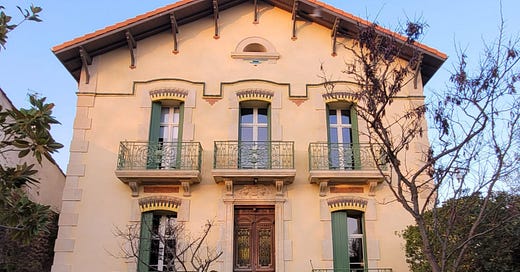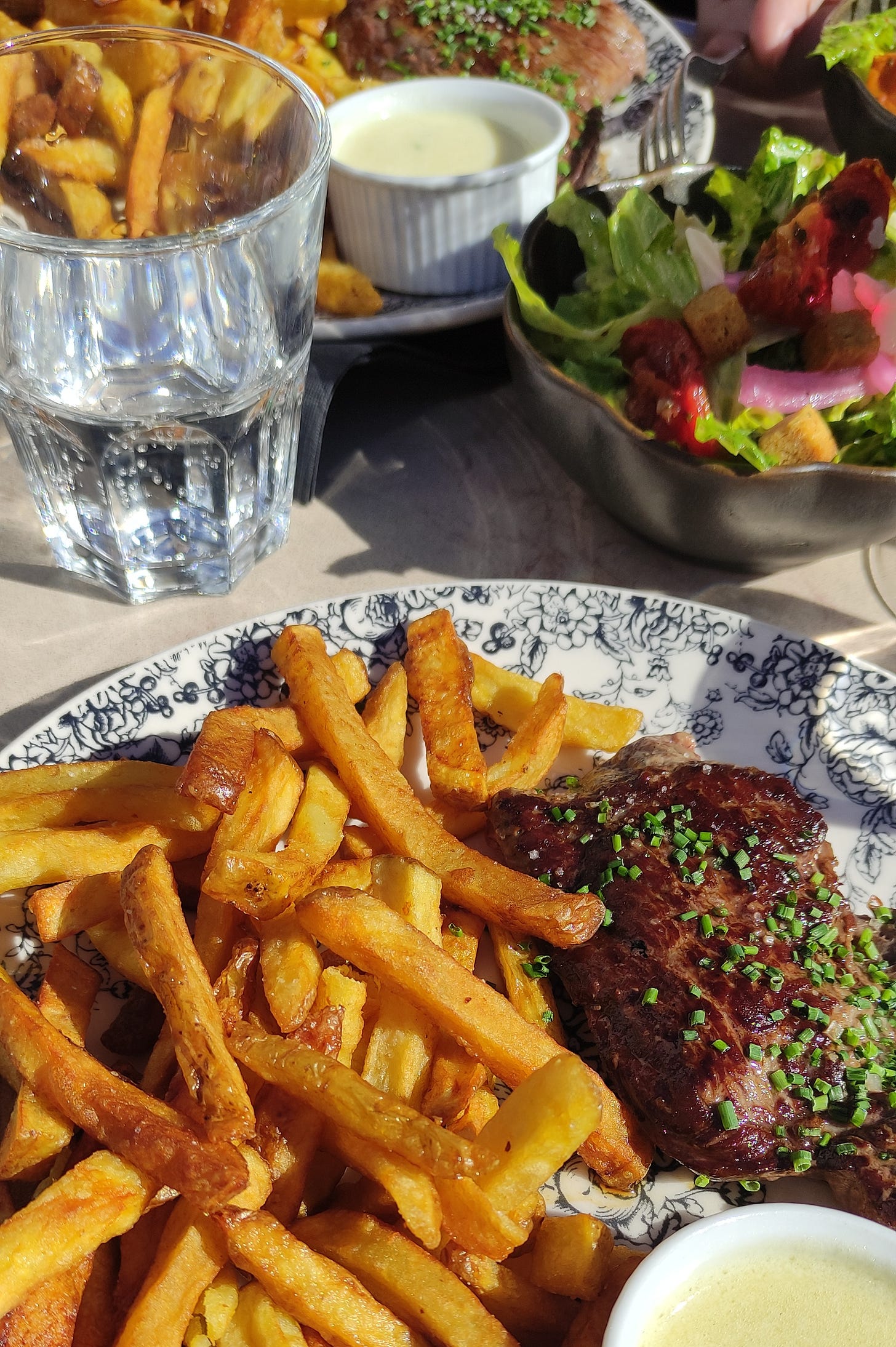So you think you want to buy a French house?
Some of you have asked me what it’s like to buy a house in France, so today I’m sharing a quick romp the process. Plus a thrifty, delicious recipe for pork chops and boulangère potatoes.
First, find your French house.
There are two kinds of people when it comes to house hunting. Normal people, with sensible budgets and checklists that include an ideal number of bedrooms, some outside space, and a pool, yes or no? Or those people, like me, who just lose their heads to a house and throw their whole lives up in the air to acquire it.
Whichever type you are, here are the things I wish I had known before the throwing in the air bit, like Mary Tyler Moore and her hat in the opening credits to her eponymous show.
Whether you just lost your head or you’re a checklist person, once you’ve hunted down your house or apartment, you’ll want to put in an offer. In many cases - whatever you might have seen on those daytime property shows - a super-low offer is unlikely to be accepted. Try your arm, certainly, but you run the risk of the seller dismissing you entirely, as an unserious person. In France, being une personne sérieuse is a quality held in high regard.
My friend the estate agent: “I call those English specials. French people mostly don’t want to bother with all that work. They’d rather have a nice new villa with a pool.”
Houses in popular locations or those with especially desirable features can get snapped up very quickly, so if you’re serious, act seriously. Of course, famously there are houses here that remain on the market for years and years, but often they’re especially remote or in a very poor state. (My friend the estate agent: “I call those English specials. French people mostly don’t want to bother with all that work. They’d rather have a nice new villa with a pool.” Also, French people are less likely to underestimate how much work and materials cost.) Sometimes, places remain on the market for years, deteriorating glumly, because the law in France is that children must inherit equally, and houses slowly crumble as the heirs can’t agree on whether to sell them or keep them.
If your offer’s accepted, generally the agent will stop showing the property for a period of time while you begin to organise your sales agreement or compromis de vente. At this point, you must appoint a notaire (a French lawyer and public officer who deals with property transactions). It’s common here for buyer and seller to use the same notaire, but it’s also perfectly fine to have your own (we did).
The compromis, as you might expect, is a lengthy and sombre document which includes many of the things you might expect: confirmation of the ownership of the title deeds; details of taxes and fees; provisional completion date (normally about three to four months from signing); lists of fixtures and fittings included in the sale; results of the Dossier de Diagnostic Technique (DDT- a series of surveys and reports, though not a full structural survey, which you have to arrange separately; many French people don’t bother with structural surveys), any provisional clauses (clauses suspensives) such as the sale being dependent on a mortgage offer or planning permission being in place; and the amount of the deposit, which is usually about five to ten per cent.
After you receive the contract and pay your deposit to the notaire, you have a ten-day cooling off period, during which you can pull out without penalty. If you pull out any later than this, in most circumstances you will lose your deposit. If the seller pulls out, they must return your deposit and sometimes pay a further penalty.
One of the best things about signing the compromis is that once you’ve signed it, it’s highly unlikely that your deal will be derailed. The seller is legally required to sell the house to you. You can practically start ordering curtains. It’s not like in the UK where, as we all know, actual psychopaths – or people temporarily turned into psychopaths by the intense awfulness of our property-buying process – can attempt to gazump you practically as the removal van is pulling up to your house.
One quirk of French property purchasing is that contracts are subject to laws of pre-emption. This can mean that the local mayor can step in and buy the house for the commune at the price you agreed with the seller. They have two weeks to do this and it’s quite the nail biter, I can tell you. It is rare, but it does happen. A friend told me a story of a seller who made a deal with a property developer to sell their house with some of the money going through the normal channels, some off the books. The mayor, perhaps sensing something amiss, swept in and bought the house and the seller was forced to accept the much lower, on-the-books price. The moral of this story: don’t mess with the mayor.
Once you’ve got past this point, you can relax a bit until – big finish – you’re ready to sign the promesse de vente, the final deed of sale. This usually happens in the notaire’s office, where the buyer and the seller, or their proxies (you need to give power of attorney to your proxy in order for them to sign on your behalf) sit patiently while the notaire reads out the whole contract. If you don’t have fluent French, you need to have a translator come along with you. In fact, the notaire may insist on it, and recommend a court-appointed translator for you. You’re buying a house, not a beer, so it’s probably for the best.
The Marseillan Port live webcam - Warning this can become quite addictive…
We signed our promesse de vente during Covid lockdown, so we did it – like almost everything else during that extraordinary time – via Zoom. We sat in my parents’ dining room in County Durham, our notaire, our seller’s notaire and my husband and I in little boxes on our computer screen. Despite the enormous seriousness of the transaction (HERE take all my money), I felt that sense of ennui I used to feel during double maths as our notaire read out endless clauses about boundaries, flooding and lead paint. To the left of the computer, I’d set up my laptop and logged onto the port’s live webcam. At the exact moment we “signed”, that very “I do” second, I wanted to be able to see my house. So we sat at that table, the scene of so many family Christmases, Easters, birthdays and Sunday lunches, the anchors of my past life, and on the screen I looked at the postcard-blue sky, the boats on the harbour, and our house, our new bricks-and-mortar life a thousand kilometres away. Click. Done.
This is by necessity a speedy romp through the bare bones of the process of buying a home in France. Of course, arm yourself with as much information as you can and seek sound, comprehensive legal advice. I found the website french-property.com clear and helpful as an introduction to the way it all works. There are also hand holders, British and French people you pay to steer you through the legalities. Some of them are excellent, but not infrequently, I hear stories of hand holders who are hopeless, bordering on – or actually – criminal, so check them out thoroughly before you part with any money.
If you decide this is for you, I hope you find your heart’s desire, whether that’s a nice villa with a pool or a charming wreck. You’ll know it when you see it.
WHAT I’VE BEEN DOING THIS WEEK
I wrote a piece for The i Paper on what the French really eat at home, inspired by news that they eat so many oven chips, there’s a place in northern France nicknamed La Vallée des Frites because it’s home to so many factories processing potatoes into chips.
Côtes de porc sauce charcutière avec pommes de terre boulangères
Pork chops with charcutière sauce and boulangère potatoes

These chops are so easy, with a great sauce which is rich and tangy from the mustard and the cornichons. It’s simple enough for a rainy Tuesday night, smart enough for guests, and relatively inexpensive to make.
I serve these pork chops with the boulangère potatoes – the kind, homely sister of dauphinoise potatoes – and a green salad. I like a frisée or endive salad with this as the bitterness of the leaves and their robust textures work so well with pork, but obviously use whatever salad leaves you prefer.
Serves 4
Keep reading with a 7-day free trial
Subscribe to Lickedspoon with Debora Robertson to keep reading this post and get 7 days of free access to the full post archives.





